
MOVIE SHELF: COMPARING FILMS TO THEIR LITERARY COUNTERPARTS
christopher funderburg & john cribbs
ADAPTATIONS OF RICHARD STARK'S PARKER SERIES
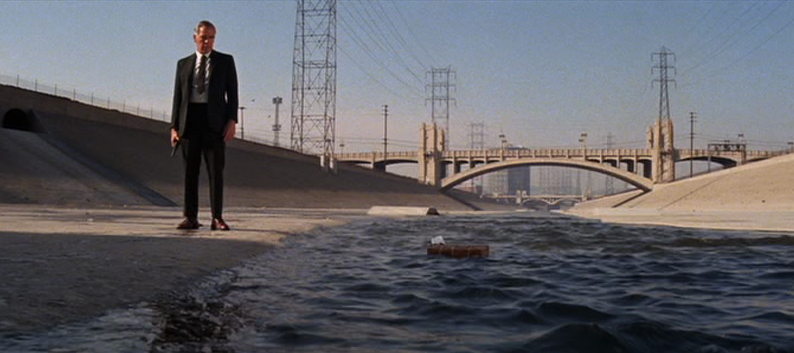
based on the Parker books by RICHARD STARK, a.k.a. DONALD WESTLAKE
Welcome to Movie Shelf, a series that compares the films on our dvd shelves to the novels on our bookcases. We at the 'smoke have always been fascinated by screenplay adaptation: what a script writer takes from the original source material, what he changes, how the two different works vary from each other and what the existence of the movie itself says about the book and vice versa. All this and more will be examined in this ongoing line of articles.
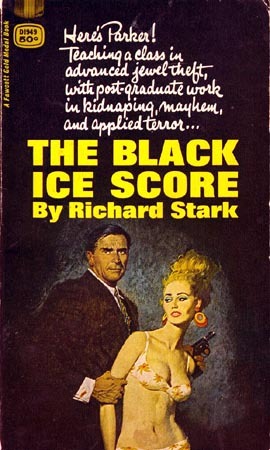
christopher funderburg
So John, let me start this by prefacing for our audience that I had the idea to do a Movie Shelf (our ongoing series where we compare film adaptations to their sources) that covers the entire Parker series. Not just because you and I are reasonably big fans of the series, but also because the Parker character is one of the most frequently adapted (and imitated) characters I can think of who isn't a household name. For a guy who isn't as well-known as Peter Parker or even Phillip Marlowe, he's outpaced them in terms of appearances on the big screen. In the internet age when everybody knows everything, he's as close to a cult icon as you can get - even your dad has heard of The Room or Sharknado and record sales are down to a point where there's almost no difference in popularity between an ostensibly hip, counter-cultural figure like Lana Del Ray and a purely pop figure like Ellie Goulding.
Maybe now that there's a Jason Statham movie out there actually called Parker, his profile has gone a little mainstream, but I still think Parker is surprisingly marginal, the definition of a cult phenomenon: both wildly beloved and basically unknown. Part of this undoubtedly stems from the fact that he exists mainly as a literary creation, and who reads books anymore? I don't think it's even slightly controversial to say that graphic novels, video games and even underground hip-hop all occupy a more prominent cultural space than pulp novels do - we live in an age when savvy audiences are more likely to have given Transmetropolitan a chance than to even know what the fuck Butcher's Moon might even be. A late-70's Television EP? A Garth Ennis one-shot that serves as the basis for a new Clive Owen movie? A book? Oh, I've heard of those.
As I mentioned on the phone last night when I pitched this idea to you, this week I finally read Donald Westlake's Comeback - written, as all the Parker novels are, under his Richard Stark nom de plume and first published after a 23 year break in the series. Through no intentional design, I also caught up with the Statham-starring/Taylor Hackford hacked-up Parker. As you know, I had been hesitant to dig into the set of the eight books written after that 23 year break - I am obviously a huge fan of the original 16 novels, but had some nagging suspicion that Parker's return after such a long year absence might not be up to snuff. I figured I would get around to them at some point, but I wasn't in any hurry. I had disliked the series' Grofield spin-offs (e.g. The Damsel and The Blackbird*) and didn't have total confidence that Westlake would bring Parker back in fine form.
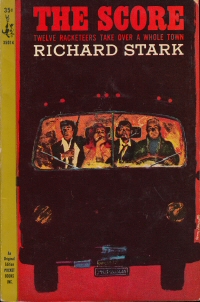
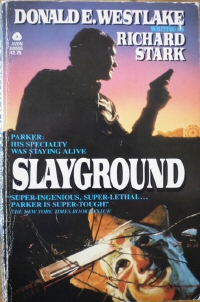
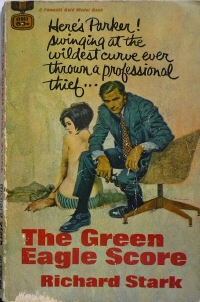
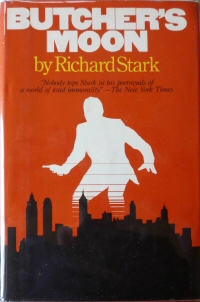
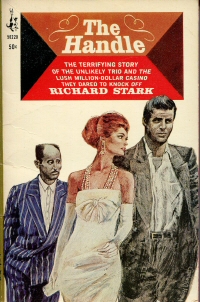
The original 16 books written in 1962 through 1974 are a nearly perfect set; the only real misstep being The Black Ice Score, in which Parker is convinced by his long-term girlfriend to help African dissidents out of the goodness of his heart.** I had heard the 8 recent novels (released between 1997 and 2008) were "pretty good," but none of them ever seemed to come up in any "best of the series" discussions. I had my doubts, is all. And I didn't hear anything about the Statham film that made me feel like it would be worth an effort to run out and see it. When it turned up on Netflix Instant the same week I was reading Comeback, I gave it a whirl.
The combination of the new book and new movie made me decide we should do this, settle it once and for all, Parker-style, not have any unresolved issues hanging around to haunt us for the rest of our critical careers. We, you and me, Mr. John Cribbs, needed to sit down and do a Movie Shelf on every film we've seen adapted from the Parker series, no more pussy-footing around on individual movies like Made in U.S.A. or my abortive piece on The Split. It's time to handle our business. Parker's popularity in terms of cinematic adaptations is a bit of a curiosity, and I think we should dig in whole hog.
Now, there are holes in our knowledge of the series and adaptations, but I think we have pretty good credentials: I've read every book in the original 16 novel run, as well as the first three books after the character's "comeback." I read three of the Alan Grofield spin-off novels and John Gores' Plunder Squad cross-over, Dead Skip. I have seen every Parker-sourced film of which I am aware save the nearly impossible-to-find French adaptation of The Score, titled Mise à Sac, as well as most of the Westlake-associated movies such as The Hot Rock, Bank Shot, The Grifters and The Stepfather. I even saw - in the theater - What's the Worst That Could Happen?, the Martin Lawrence/Danny Devito movie based on a Dortmunder novel. I've seen dozens of films by the most notable Parker adaptators: Jean-Luc Godard, John Boorman, John Flynn, etc. I know what I'm talking about here, is what I'm saying. Also, that paragraph conveniently outlines a bit of the framework on the Westlake-and-Parker sprawl for those unfamiliar with it! Like Parker, I am efficient. And like Parker, I will be as lusty as a satyr after the job of writing this article is completed.***
Let's start by addressing the big questions:
1) What is the best casting of the Parker character?
The common answer is Lee Marvin and it might be sacrilegious to say so, but I definitely disagree. I actually want to hear your answers to these questions first before I throw my answer to this one, but I will say my answers to all three of these questions are intertwined.
2) What is the best film based on a Parker book?
The answer here is John Boorman's aesthetically adventurous New Hollywood masterpiece Point Blank. I think you can make an argument for some of the other films, but those arguments are tough to buy. I break the list of adaptations down something like this:
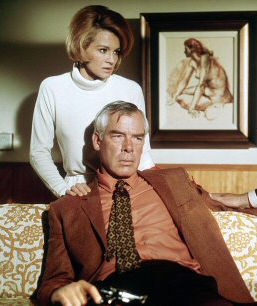
The Good Ones:
Point Blank
The Outfit
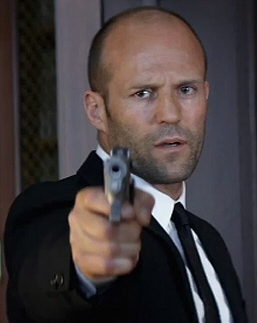
The Iffy Ones:
Payback: Straight Up
Parker
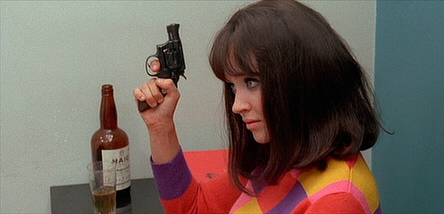
The Big Messes:
The Split
Made in U.S.A.
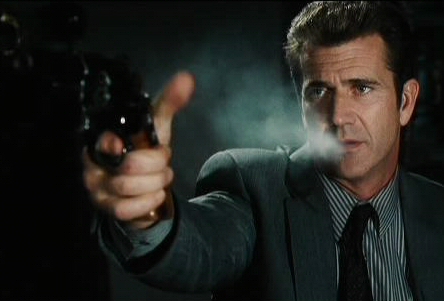
Not Worth Anybody's Time:
Payback
Slayground
3) What is the most faithful Parker adaptation?
I think there are three, maybe four films on the same level of faithfulness and Point Blank isn't one of them. Again, I don't want to pollute your answers, so I'll hold my tongue here and pass it over to you here, John. gimme your answers, of course, but also feel free to throw in a few introductory comments and justify why you named your daughter after a Godard character instead of naming her "Claire." Is it because Claire sucks? That's Parker's woman you're bad-mouthing, man!
john cribbs
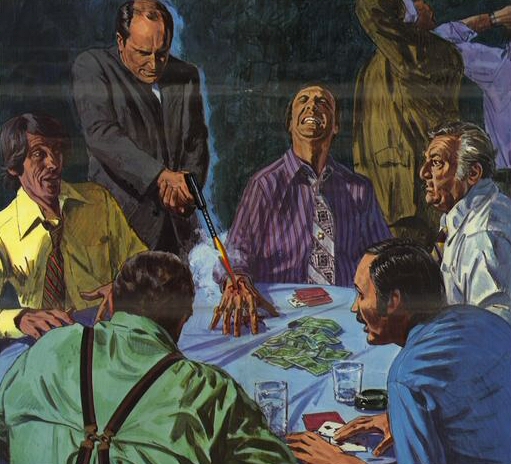
If my daughter's name had been inspired by a Westlake creation, she would have been "Honeybun Bazoom Cribbs," after the erotic dancer who broke Dortmunder's heart at the beginning of The Hot Rock.
Funny that you had your recent Parker kick, as I just finished reading the final three books of the "new" series: Nobody Runs Forever, Ask the Parrot and Dirty Money. As a whole I enjoyed all eight of the later Parker books, but there's definitely a sense of watering down: not of the Parker character exactly, but of the world he inhabits. The first 16 novels had their share of inept crooks, shady middlemen, hapless amateurs, reactionary backstabbers, cranky blind arms dealers and, yeah, Grofield, but these last three in particular are rife with goofy Elmore Leonard-type characters: an eccentric artist/counterfeiter, a sexy blonde bounty hunter, a sexy blonde detective, hillbilly brothers looking to horn in on Parker's score, a greedy bank manager and a guy named Roy Keenan (I've never heard such a standard Elmore Leonard character name outside an actual Elmore Leonard book).
Pitted against people like this, it makes Parker seem like less of a stone cold badass and more of a bully whose rough handling comes off as simply petty. Which is sort of the point of Ask the Parrot, a book Westlake described as "Parker among the straights," but story elements that were easy to overlook in the original series - bad decisions Parker makes, unbelievable developments, subplots that kind of fizzle out - are more apparent the broader Parker's world becomes. Westlake's "Richard Stark" writing persona is all about grim and gritty minimalist descriptions as opposed to flowery over-writing, and I have to admit that the later books kind of betray that objective - not flagrantly, but it's unquestionably there. Parker didn't wear disguises and target such exotic venues as a Hudson River ferry in the first 16 novels, is all I'm sayin.
That said, the last three books are still kind of great. Like the best sets of Parker reads - the first three books (The Hunter, The Man With the Getaway Face and The Outfit) and last three of the original series (Slayground, Plunder Squad and Butcher's Moon) - they form a connected trilogy based on Parker losing some money and pulling out all stops to get it back. Just like the heads of the Outfit and the Fun Island mob from Butcher's Moon, people who think they can take advantage of Parker quickly learn what a bad idea that is.
These three stand out from the other "new" books, and not only because they discontinue the connected compound titles (the previous five were Comeback/Backflash/Flashfire/Firebreak/Breakout). They back Parker into a corner he has to break his way out of, and things get a little harder for him - I think going into this last set, he's like 4-for-5 as far as successful heists; these raise the stakes a little (even if the heist in the middle book is possibly the most ridiculously easy of his entire career). They take interesting risks the old books didn't: Ask the Parrot features a chapter from the parrot's point of view**** which, amazingly, works. They stand on their own, which in itself is very much in the spirit of Parker.
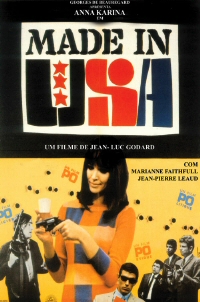
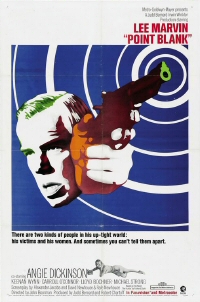
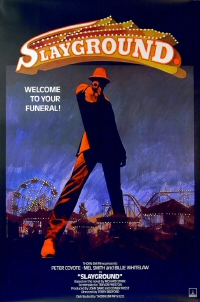
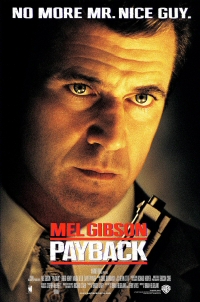
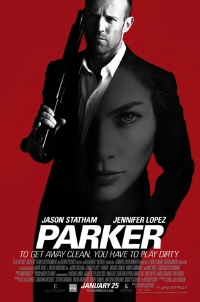
Would these last few books make good movies (or, one good movie combining all three)? I think so, but they'd never be adapted without the kind of compromises the Stark-based films up to this point have been forced to make. The thing is, mainstream audiences need someone to root for. They need a lead character displaying some semblance of noble intentions, even if they are unmistakenly a crook. Filmmakers have been too tempted to give Parker a spark of personality or motivation. Even The Outfit, which is arguably the most faithful adaptation, has Robert Duvall's Maclin getting revenge for the death of his brother, something Parker (if he had a brother) would never even consider.
It was Payback star/noted Hollywood nutjob Mel Gibson second-guessing how the audience would perceive his Parker surrogate Porter, then hiring the co-writer of the Mad Max movies to tack on some voiceover and putting the production designer in the director's chair, that ruined what could have potentially been the most Parker-esque of the Parker movies. Westlake himself almost made the mistake of making Parker too sentimental in the first draft of The Jugger, in which Parker stuck out his neck to help a former colleague, but corrected it so Parker is just covering his own ass. What Hollywood so often gets wrong is that Parker looks out for himself: he's in it for the payday, and only puts himself at risk if somebody's trying to take away his piece of the action. He certainly doesn't mope over being indirectly responsible for some kid getting killed in a car accident, an act that feeds on the soul of Peter Coyote's sensitive Stone throughout the torturous running time of Slayground.
This is the misconception that's tainted all the Parker movies. In The Hunter - the first Parker book and source for both Point Blank and Payback - Parker's motivation isn't revenge; at least, not in the sense that he's been personally offended by his partner Mal Resnick shooting him. In fact, prior to being shot, Parker had the same idea to double cross Mal. That notably never came up again in the series: from that point on in the books, Parker's one redeeming attribute is his professionalism when it comes to everyone involved in the crime earning his agreed-upon share. Of course, situations changed those arrangements but Parker could be described as more or less "honorable," certainly trustworthy. In Hunter, Parker goes after Mal to get his share of the heist; he strikes back at the Outfit that took his money (over the next two books) only when they come after him. In this respect, Brian Helgeland was actually more on target (or if you like, point blank) than John Boorman by making Porter's motivation more about money than vengeance in the non-Gibson tainted Payback: Straight Up.
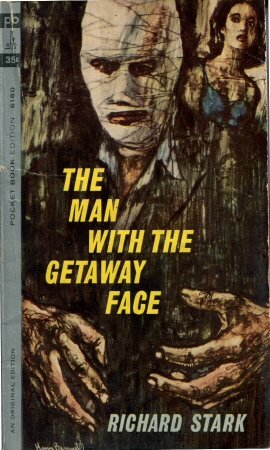
* The Blackbird shares an opening chapter with the excellent 14th novel in the Parker series, Slayground, so that's where I began. And...oof. I'm not a fan of the "humorous" Alan Grofield character to begin with - the idea that he funds his acting career and struggling theater company with money from the jobs he pulls with Parker is pretty contrived and the way Stark writes him as a stereotypical theatrical, pseudo-sophisticated artsy type makes the character deeply unpalatable to me. The silly "you're gonna help the government unravel an international political conspiracy - or else!" plot of The Blackbird is particularly credibility-assaulting and just not my cup of tea.
** I've always thought that Black Ice would have been better served as one of Westlake's Dortmunder novels. Not that the book is humorous in the same way as that series, just that the lead character's actions would have been more plausible coming from the generally decent and clever John Dortmunder rather than the ice-cold, ruthless Parker.
*** That very gross description of Parker's work/sex habits appears in a bunch of the novels to convey how Parker never thinks about sex when the job is on, but loves getting down to makin' sweet love once the job is complete. It's just a yucky image - Parker as a horny, shirtless goat-legged creature.
***** Sort of like the German shepherd's flashback from The Hills Have Eyes Part II.
<<Previous Page 1 2 3 Next Page>>
home about contact us featured writings years in review film productions
All rights reserved The Pink Smoke © 2014